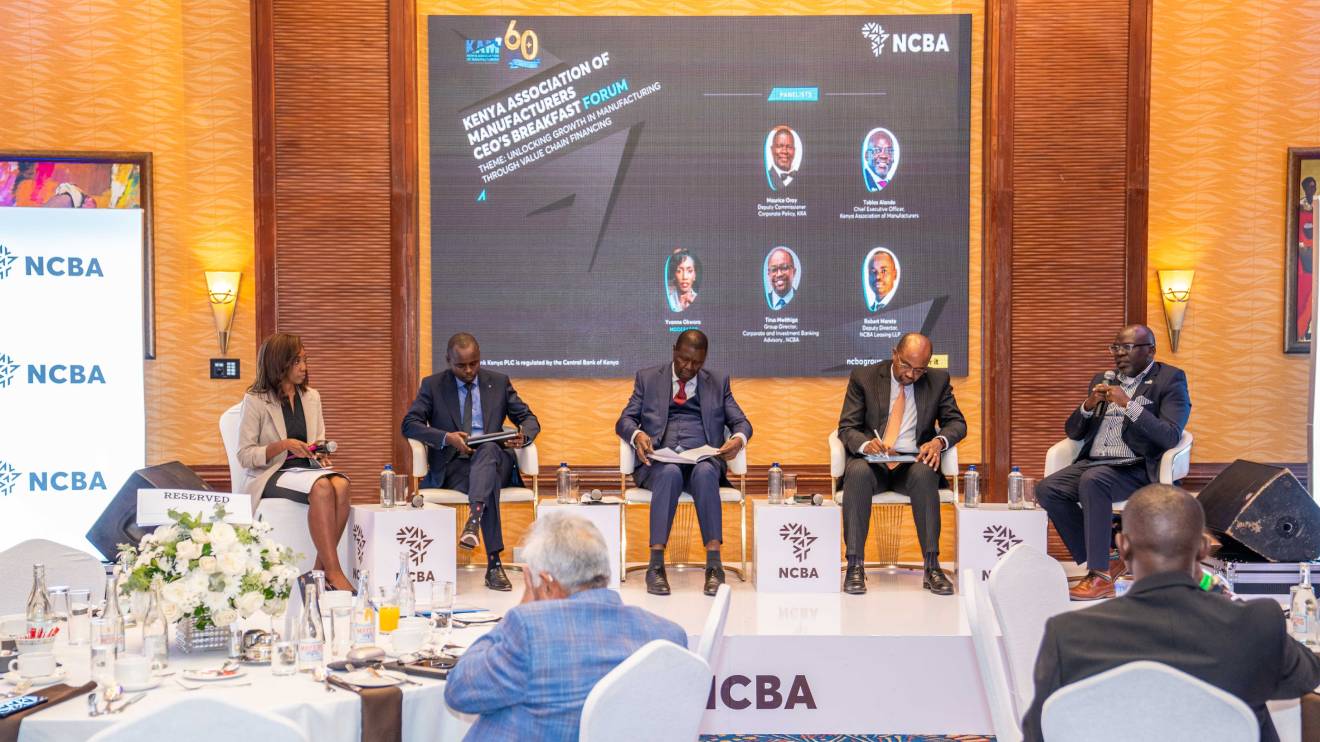In a high-level gathering of industry leaders, NCBA Bank and the Kenya Association of Manufacturers (KAM) convened a CEOs breakfast forum in Nairobi on Thursday, calling for a radical shift in how financing is deployed across the country’s manufacturing value chain.
Held under the theme “Unlocking Growth in Manufacturing through Value Chain Financing,” the meeting brought together financial experts, policymakers, and industry players to deliberate on ways to enhance access to capital and unlock the sector’s potential.
The manufacturing industry, which directly employs over 350,000 Kenyans and indirectly supports more than 1.6 million, remains hamstrung by capital constraints, fragmented supply chains, and regional market inefficiencies.
According to NCBA Group Director of Corporate and Investment Banking Advisory, Tirus Mwithiga, there is an urgent need to re-engineer Kenya’s capital deployment model within the manufacturing landscape.
“Manufacturing currently contributes 7.3 per cent to Kenya’s GDP, significantly below the government’s 2030 vision target of 20 per cent. This forum underscores our commitment to go beyond banking, to become true enablers of business transformation for manufacturers,” Mwithiga said.
Read More
NCBA presented a suite of financial tools tailored for industrial players, including asset leasing, trade finance, and supply chain financing, positioning them as crucial levers for cash flow stability and operational resilience.
The bank also underscored its broader strategy that goes beyond conventional lending, involving long-term advisory, ecosystem partnerships, and engagement in policy formulation.
Mwithiga further elaborated on the institution’s approach, stating, “We are working closely with industry associations, aggregators, and off-takers to fund structures that traverse entire value chains. This reduces risks to our customers and ensures that funding leads to measurable growth. We are also actively participating in public-private dialogue to shape policies that improve the ease of doing business and conducting market research to facilitate our clients in making viable decisions.”
Fresh data from the Kenya National Bureau of Statistics (KNBS), released on Tuesday, indicates that the manufacturing sector registered a 2.1 per cent growth in the first quarter of 2025, contributing to the national GDP growth of 4.9 per cent. Despite this uptick, the sector remains below expectations set under Vision 2030, largely due to structural and financial bottlenecks.
KAM Chief Executive Tobias Alando highlighted the need for holistic financing frameworks that address the sector’s cyclical nature.
“When we talk about value chain financing, we are talking about ensuring everyone in the chain: from the farmer, aggregator, transporter, to the processor and final manufacturer, is bankable. That means innovative financing products that respond to the cyclical nature of the manufacturing sector,” Alando stated.
Alando also pushed for financial instruments that are not only accessible but tailored to the production cycles of industry players.
“We need affordable and long-term financial instruments that align with production cycles, de-risk investment in primary processing, and support businesses, from SMEs to larger players to expand and stay competitive in both local and global markets,” he added.
Alando further stated that Kenya’s manufacturing sector faces real fragilities and that, to move forward, the country must diversify its resources and find the right balance between people, machines, finances etc.
Maurice Oray, Head of Corporate Policy at the Kenya Revenue Authority (KRA), joined the discussion by reaffirming the tax authority’s role in supporting industrial growth.
He echoed the need for clarity in policy and taxation frameworks to complement financing reforms and improve investor confidence across the value chain.
“The cost of doing business is directly affected by taxes. If we want to grow exports, we can’t keep exporting taxes. It hurts our competitiveness.” Oray said.
“The cost of capital for manufacturers is still too high. We need solutions that reduce the cost of raising finance and unlock access.”
The breakfast forum concluded with a unanimous call for deeper collaboration between the government, financial institutions, and manufacturers.
Delegates agreed that such partnerships are essential to reconfigure Kenya’s manufacturing narrative — from one of untapped potential to one of inclusive growth and global competitiveness.
As NCBA and KAM continue to champion structured financing models and policy advocacy, attention now turns to how swiftly these initiatives can translate into tangible transformation for the country’s industrial sector.



-1757586635.jpg)





